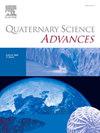Historical vegetation shifts in southeastern Amazonia: Unraveling ecotone dynamics in the Carajás region over the last ∼14000 cal yr BP
IF 2.2
Q2 GEOGRAPHY, PHYSICAL
引用次数: 0
Abstract
This study investigates the Pleistocene–Holocene transition in Serra Leste, a highly endangered southeastern Amazonian ecotone, with a focus on the lake-filling process, climate changes, and potential consequences to forest and savanna dynamics. The lake's development began at approximately 14000 cal yr BP, resulting from the collapse of the fractured lateritic crust. Sedimentation patterns and geochemical, palynological and micro-charcoal proxies reveal shifts in detrital input and redox conditions, forest/savanna areas, and local and regional fire events, indicating a highly dynamic environmental history. The evolution of the lake is characterized by initial deltaic lobe deposition and forest dominance, followed in the Middle Holocene by sedimentary gaps or reduced detrital input; woody vegetation dominance, with a notable shift toward a more open landscape; and savanna and semideciduous dry forest, accompanied by a decrease in ombrophilous forests. A resurgence in arboreal elements recorded in the Late Holocene indicates an expansion of ombrophilous forests under wetter climate conditions and the establishment of a more continuous forest matrix, with the presence of likely “hyperdominant” taxa. Frequent local fire events and the occurrence of temporarily correlated archeological sites in the Serra Leste region suggest the influence of ancient indigenous communities on vegetation changes during the Late Holocene.
亚马孙东南部历史上的植被变化:揭示卡拉哈斯地区在公元前 14000 ∼ 14000 年间的生态平衡动态
本研究调查了亚马逊东南部一个濒临灭绝的生态区--塞拉莱斯特的更新世-全新世过渡时期,重点是湖泊填平过程、气候变化以及对森林和热带稀树草原动态的潜在影响。该湖的开发始于大约公元前 14000 卡年,是断裂的红土地壳崩塌的结果。沉积模式以及地球化学、古生物学和微炭代用指标揭示了碎屑输入和氧化还原条件、森林/稀树草原区域以及局部和区域火灾事件的变化,表明了一个高度动态的环境历史。湖泊演变的特点是最初的三角洲叶沉积和森林占主导地位,随后在中全新世出现了沉积缺口或减少了碎屑输入;木本植物占主导地位,并明显转向更开阔的地貌;以及热带草原和半落叶干燥林,同时滋养林减少。全新世晚期记录到的树栖要素的恢复表明,在更潮湿的气候条件下,滋养层森林有所扩大,并建立了更连续的森林基质,可能出现了 "超优势 "类群。塞拉莱斯特地区频繁发生的地方性火灾事件和临时相关的考古遗址表明,古代土著社区对全新世晚期的植被变化产生了影响。
本文章由计算机程序翻译,如有差异,请以英文原文为准。
求助全文
约1分钟内获得全文
求助全文
来源期刊

Quaternary Science Advances
Earth and Planetary Sciences-Earth-Surface Processes
CiteScore
4.00
自引率
13.30%
发文量
16
审稿时长
61 days
 求助内容:
求助内容: 应助结果提醒方式:
应助结果提醒方式:


